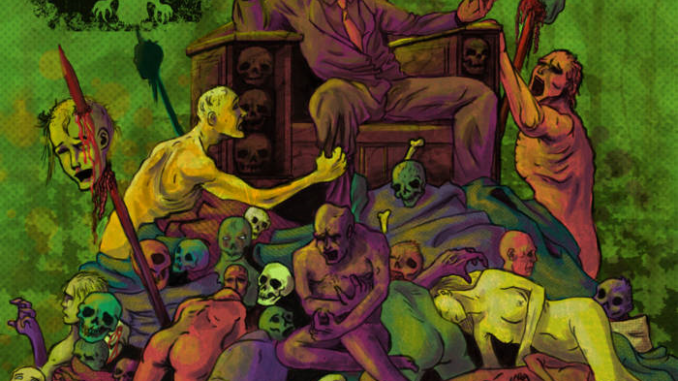
“Punk is dead.â€
It’s a sentiment nearly as old as the genre itself, and yet, punk exhibits signs of life, in recent years by adopting contemporary sounds, and occasionally, and momentarily becoming culturally relevant. While the days of CBGB’s and basement shows are behind us, there is still some life left to live for the average punk who is willing to accept trace amounts of modernity. Voice of Addiction might just be one of those choice few punk bands thriving in the modern era due to their willingness to embrace and abrade modern society.
And though Voice of Addiction makes good use of the three-chord skate punk template, their second full-length album, The Lost Art of Empathy, is brimming with craftiness. Third track begins with vocalist Ian Tomele abandoning his sing-along friendly cadence for a commandeering bark, placed over dissonant chords that invoke post-hardcore passages from the early to mid-2000s. He is accompanied moments later by a clean backing chant that sits intentionally askew over the original vocal line. The effect is a moment of duality and dissonance that serves to bolster the instance in which both vocalists find each other once more for a soaring, harmony-laden chorus. It’s a crafty songwriting technique which tells the listener that Voice of Addiction is comfortable with experimentation, but never at risk of abandoning their core sound.
These precedents are set early on so that you know you’re never too far from home base, even when songs begin and end with ska and two-step passages respectively.
As is the case with any band crossing the genre-barrier, there are a few moments in which passages may feel a bit contrived, or directed by a quota. It is much easier to imagine the band set out to achieve the aforementioned ska passage than it is to believe in its natural occurrence. VOA’s strength is in honoring tradition until the listener can familiarize themselves with their surroundings, before shifting jarringly into new territories.
With every instrument coming in clearly, the production on the album is a highlight, giving every member of the band a few stand-out moments throughout the albums 30-minute run. The vocals sit comfortably in the mix amongst a bouncy bass tone, bright drum sounds, and a guitar tone that utilizes more low-end frequencies than your average punk band. The guitar tone lends itself toward the overall flexibility of the album in a big way. The overdriven parts are not overly distorted, but weighty nonetheless. The clean passages are crisp, with no delay to muddy up the brightness of these sections. This comes in especially handy toward the end of the album, where clean, acoustic sounding passages feature more prominently, such as on closing track Are We Even Human anymore.
But subversive song-structures aren’t VOA’s only cunning maneuver.
Vocalist Ian Tomele manages to intersperse his more vulnerable, interpersonal side with rigid political statements very well, and the end result is an album teeming with lyrics as diverse as it’s song structures. Opening track Rustbelt is a tongue-in-cheek ode to being raised in a small, industrial town. “Gotta work ‘til the day I die. Gotta work just to survive,” Tomele laments during the straight-ahead punk assault of an opener.
But while some of his lyrics are light and sarcastic, there is no mistaking the vitriol behind politically charged declarations such as, “I can’t breathe. We can’t breathe.”
Voice of Addiction manages to keep their brand of punk afloat by keeping their finger on the pulse of counter-culture in the modern era. The Lost Art of Empathy isn’t punk on Broadway, it’s Bad Religion style, smart punk for the wry and politically inclined.
And this being only their sophomore effort, it’s remarkable how well Voice of Addiction has managed to hone in on their sound.
They are contemporary while paying homage to the progenitors of their genre, and it serves as a nice reminder:
Punk isn’t dead, it’s just a bit grey at the temples.

Leave a Reply